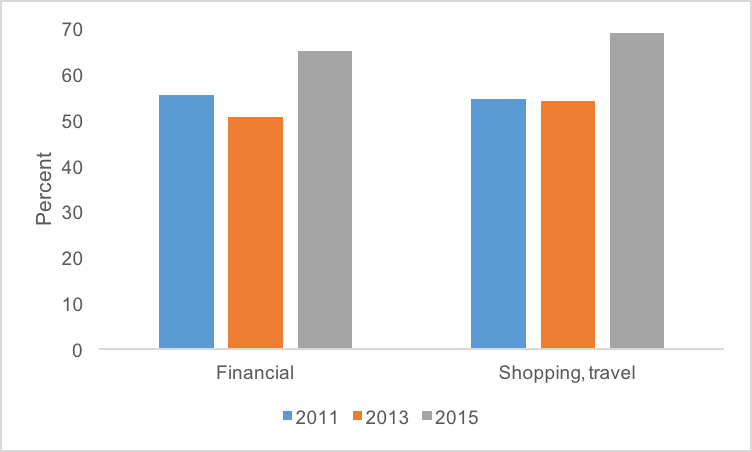An article in the Washington Post on Sunday, May 15, 2016 loudly trumpets a claim that privacy concerns are separating consumers from the Internet:
“This chilling effect, pulled out of a survey of 41,000 U.S. households who use the Internet, show the insecurity of the Web is beginning to have consequences that stretch beyond the direct fall-out of an individual losing personal data in breach. The research suggests some consumers are reaching a tipping point where they feel they can no longer trust using the Internet for everyday activities.” – Washington Post
The survey, which is the biennial Computer and Internet Use supplement of the Current Population Survey (CPS), shows that consumers worry about privacy. An NTIA blog post on the data notes that 83 percent of online households had at least one concern related to privacy, and the data itself says that 13 percent of online households have experienced some kind of data breach. But a single year of data is not a trend, making it impossible to draw any conclusions about “tipping points” or whether the concerns are “beginning to have consequences,” as the Post does.
Instead, the use of online activities, even ones involving sensitive information, continues to increase.
The U.S. Census also conducted Computer and Internet Use supplements to its annual CPS in 2011 and 2013, making it possible to explore trends. Those surveys do not ask similar questions about privacy, but they do ask about online activity. The surveys show that contrary to the Post’s interpretation, consumers are using the Internet for daily activities more than ever before (Figure 1).
Figure 1: Share of Internet Users Who Engage in Certain Activities Online, 2011-2015
Source: Current Population Survey Computer and Internet Supplement, 2011, 2013, 2015
All three surveys ask people who do not use the Internet whether privacy concerns keep them offline. In each year, less than one percent of those who do not use the Internet cited privacy as the main reason they stay offline.
The data make it clear that consumers care about their privacy. I count myself among that group—I typically use a VPN and avoid using unknown WiFi networks, for example. It is possible that consumers would have adopted online activities like financial transactions and shopping even more quickly than they have if they had more faith that their information would remain secure, but the data do not speak to that question.
Instead, the data show that despite their privacy concerns, people increasingly engage in online activities that might involve sensitive information, like financial transactions and shopping.
For its use of a misleading headline and failing to understand that a single point is not a trend, the Washington Post gets four dope-slaps.
Scott Wallsten is President and Senior Fellow at the Technology Policy Institute and also a senior fellow at the Georgetown Center for Business and Public Policy. He is an economist with expertise in industrial organization and public policy, and his research focuses on competition, regulation, telecommunications, the economics of digitization, and technology policy. He was the economics director for the FCC's National Broadband Plan and has been a lecturer in Stanford University’s public policy program, director of communications policy studies and senior fellow at the Progress & Freedom Foundation, a senior fellow at the AEI – Brookings Joint Center for Regulatory Studies and a resident scholar at the American Enterprise Institute, an economist at The World Bank, a scholar at the Stanford Institute for Economic Policy Research, and a staff economist at the U.S. President’s Council of Economic Advisers. He holds a PhD in economics from Stanford University.



